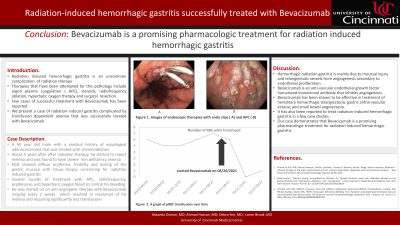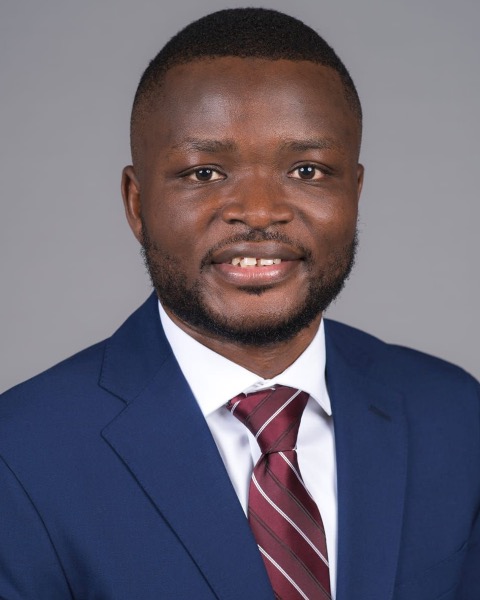Back


Poster Session B - Monday Morning
Category: GI Bleeding
B0328 - A Case Report of Radiation-Induced Hemorrhagic Gastritis Successfully Treated With Bevacizumab After Failing Endoscopic and Hyperbaric Oxygen Therapies
Monday, October 24, 2022
10:00 AM – 12:00 PM ET
Location: Crown Ballroom

Has Audio

Askanda Osman, MD
University of Cincinnati Medical Center
Cincinnati, OH
Presenting Author(s)
Askanda Osman, MD1, Ahmad M. Hassan, MD1, Loren P. Brook, MD2
1University of Cincinnati Medical Center, Cincinnati, OH; 2University of Cincinnati medical center, Cincinnati, OH
Introduction: Radiation induced gastritis is an uncommon complication of radiation therapy. Therapies that have been attempted for this pathology include argon plasma coagulation (APC), oral prednisolone, radio-frequency ablation, hyperbaric oxygen, and surgical intervention. We present a case of radiation induced gastritis complicated by transfusion dependent anemia and melena that was successfully treated with Bevacizumab
Case Description/Methods: This patient is a 65-year-old male with medical history significant for esophageal adenocarcinoma in 2014 treated with chemoradiation and subsequently esophagectomy. Several years after therapy, he started to report tarry stools, and was found to be anemic with iron studies consistent with severe iron deficiency. He had an esophagogastroduodenoscopy (EGD) that showed severe distal esophagitis. Follow up colonoscopy was unremarkable. He was started on omeprazole and iron infusions, but he needed frequent blood transfusions.
He had a repeat EGD that showed diffuse erythema, friability and oozing of the gastric mucosa. This was treated with APC. A biopsy showed a single focus of intravascular fibrin thrombus concerning for radiation induced gastritis. He had transient resolution of his melena, but then had recurrence one month later.
He underwent further endoscopies with thermal therapy, which failed to control his bleeding. Hyperbaric oxygen therapy was trialed. After completing multiple sessions, his symptoms persisted. Surgical evaluation was recommended but the patient declined. The patient was then started on anti-angiogenic therapy with Bevacizumab 5mg/kg every 2 weeks and his melena resolved, requiring less transfusions. He stopped taking Bevacizumab two months later as he was scheduled for hernia repair, and he had recurrence of his melena and worsening anemia post-operatively. After being restarted on Bevacizumab, his melena resolved
Discussion: Hemorrhagic radiation gastritis is mainly due to mucosal injury and telangiectatic vessels from angiogenesis secondary to endothelial proliferation. Bevacizumab is an anti-vascular endothelial growth factor humanized monoclonal antibody that inhibits angiogenesis. It has been shown to be effective in treatment of hereditary hemorrhagic telangiectasia, gastric antral vascular ectasia, and small bowel angioectasia. It has also been reported to treat hemorrhagic gastritis in a few case studies. Our case demonstrates that Bevacizumab is a promising pharmacologic treatment for radiation induced hemorrhagic gastritis.
Disclosures:
Askanda Osman, MD1, Ahmad M. Hassan, MD1, Loren P. Brook, MD2. B0328 - A Case Report of Radiation-Induced Hemorrhagic Gastritis Successfully Treated With Bevacizumab After Failing Endoscopic and Hyperbaric Oxygen Therapies, ACG 2022 Annual Scientific Meeting Abstracts. Charlotte, NC: American College of Gastroenterology.
1University of Cincinnati Medical Center, Cincinnati, OH; 2University of Cincinnati medical center, Cincinnati, OH
Introduction: Radiation induced gastritis is an uncommon complication of radiation therapy. Therapies that have been attempted for this pathology include argon plasma coagulation (APC), oral prednisolone, radio-frequency ablation, hyperbaric oxygen, and surgical intervention. We present a case of radiation induced gastritis complicated by transfusion dependent anemia and melena that was successfully treated with Bevacizumab
Case Description/Methods: This patient is a 65-year-old male with medical history significant for esophageal adenocarcinoma in 2014 treated with chemoradiation and subsequently esophagectomy. Several years after therapy, he started to report tarry stools, and was found to be anemic with iron studies consistent with severe iron deficiency. He had an esophagogastroduodenoscopy (EGD) that showed severe distal esophagitis. Follow up colonoscopy was unremarkable. He was started on omeprazole and iron infusions, but he needed frequent blood transfusions.
He had a repeat EGD that showed diffuse erythema, friability and oozing of the gastric mucosa. This was treated with APC. A biopsy showed a single focus of intravascular fibrin thrombus concerning for radiation induced gastritis. He had transient resolution of his melena, but then had recurrence one month later.
He underwent further endoscopies with thermal therapy, which failed to control his bleeding. Hyperbaric oxygen therapy was trialed. After completing multiple sessions, his symptoms persisted. Surgical evaluation was recommended but the patient declined. The patient was then started on anti-angiogenic therapy with Bevacizumab 5mg/kg every 2 weeks and his melena resolved, requiring less transfusions. He stopped taking Bevacizumab two months later as he was scheduled for hernia repair, and he had recurrence of his melena and worsening anemia post-operatively. After being restarted on Bevacizumab, his melena resolved
Discussion: Hemorrhagic radiation gastritis is mainly due to mucosal injury and telangiectatic vessels from angiogenesis secondary to endothelial proliferation. Bevacizumab is an anti-vascular endothelial growth factor humanized monoclonal antibody that inhibits angiogenesis. It has been shown to be effective in treatment of hereditary hemorrhagic telangiectasia, gastric antral vascular ectasia, and small bowel angioectasia. It has also been reported to treat hemorrhagic gastritis in a few case studies. Our case demonstrates that Bevacizumab is a promising pharmacologic treatment for radiation induced hemorrhagic gastritis.
Disclosures:
Askanda Osman indicated no relevant financial relationships.
Ahmad Hassan indicated no relevant financial relationships.
Loren Brook: Abbvie – Grant/Research Support. Arena – Grant/Research Support. Bristol Myers Squibb – Grant/Research Support. Galapagos – Grant/Research Support. Gilead – Grant/Research Support. Guardant Health – Grant/Research Support. Pfizer – Grant/Research Support. Seres Theraputics – Grant/Research Support.
Askanda Osman, MD1, Ahmad M. Hassan, MD1, Loren P. Brook, MD2. B0328 - A Case Report of Radiation-Induced Hemorrhagic Gastritis Successfully Treated With Bevacizumab After Failing Endoscopic and Hyperbaric Oxygen Therapies, ACG 2022 Annual Scientific Meeting Abstracts. Charlotte, NC: American College of Gastroenterology.
